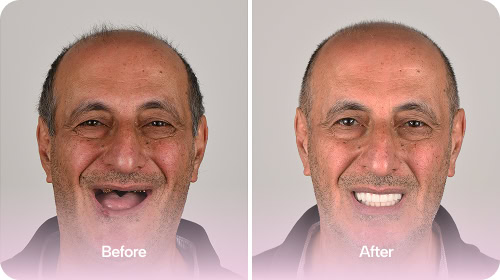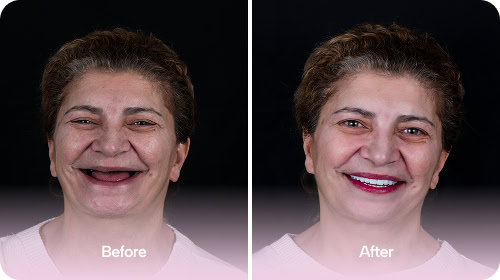
Enjoy a Natural-Looking Smile Again with Implant-Retained Dentures
Choose implant-retained dentures for a secure and natural-looking option. Improve your quality of life with enhanced comfort, jawbone preservation, and restored confidence in your smile.

Discover Long-Lasting Comfort and Confidence with Implant-Retained Dentures
Traditional dentures often slip, irritate gums, or require messy adhesives, creating frustration and discomfort. If not addressed, these problems can reduce quality of life. Implant-retained dentures eliminate these issues by offering a secure fit and natural feel. At Tweed Family Dental, we’re here to provide professional care with these reliable teeth replacement options that restore your smile and confidence.
Find Out If Implant-Retained Dentures Are Right for You
Implant-retained dentures are a life-changing option for those seeking a stable and natural-feeling alternative to traditional dentures. Determining if you’re a suitable candidate involves assessing several important factors for successful treatment, such as:
-
Candidates should have healthy gums, as gum disease or infections may affect the success of implant placement.
-
Adequate jaw bone density is required to support the implants securely, and bone grafting can be considered for individuals with insufficient bone volume.
-
Good overall health is important, as certain medical conditions or medications could impact healing and implant success.
-
A commitment to maintaining good oral hygiene and attending regular dental visits is essential for long-term implant stability and oral health.


The Long-Term Advantages of Implant-Retained Dentures for Missing Teeth
Implant-retained dentures offer a modern, reliable option for replacing missing teeth, combining functionality with aesthetics. They provide many long-lasting benefits that improve your quality of life and restore confidence in your smile, including:
-
Implant-retained dentures provide better stability and security, eliminating the slipping, shifting, or discomfort often experienced with traditional dentures.
-
They help preserve jaw bone health by stimulating natural bone growth and preventing bone loss and facial changes associated with missing teeth.
-
These advanced dentures offer a natural look and feel, significantly enhancing overall comfort and the aesthetics of your smile.
-
Implant-retained dentures improve chewing efficiency and functionality, allowing you to enjoy a wider variety of foods without pain, irritation, or movement.
Personalised, High-Quality Dental Implant Services for Every Patient
Our clinic is dedicated to providing high-quality dental implants with a focus on patient satisfaction and long-lasting results.
All-On-4 Implants
All-on-4 implants restore a full arch of teeth using just four implants for lasting stability.
Learn MoreConsultations
During consultations, dentists evaluate suitability, discuss options, and develop tailored plans to restore your smile beautifully.
Learn MoreFlexible and Affordable Payment Options for Stress-Free Dental Care
We offer a flexible, budget-friendly payment structure to make quality dental care accessible. Our dental clinic partners with major health funds to support your needs.
Child Dental Benefits Schedule
Eligible children can receive up to $1,052 over two years for essential dental treatments, which promote healthy smiles and oral health.
Dental Services for DVA Card Holders
DVA cardholders can access comprehensive dental services that provide high-quality care, ongoing support, and better outcomes for their oral health needs.
Bupa Members First Preferred Provider
As a preferred provider, eligible Bupa members enjoy enhanced benefits, reduced treatment expenses, and access to reliable dental care for eligible members.
Nib First Choice Preferred Provider
Nib First Choice members gain access to exceptional dental care, reduced treatment costs, and exclusive benefits for a seamless and stress-free experience.
CBHS Choice Network Preferred Provider
The CBHS Choice Network offers members access to high-quality dental services, lower treatment costs, and additional benefits designed for member convenience.
MediPay
MediPay offers quick, flexible loans, allowing patients to conveniently manage their dental costs and access quality dental care whenever needed.
Zip
Zip allows patients to break dental costs into manageable instalments, making essential treatments accessible, affordable, and budget-friendly without financial stress.
Afterpay
Afterpay allows patients to split dental treatment costs into four interest-free payments, providing flexibility, convenience, and accessible options for essential care.
smile.com.au
Save on dental treatment in Tweed Heads with smile.com.au membership—no waiting periods, no caps, and no exclusions, just hassle-free savings on dental care.
Explore Our Smile Gallery of Dental Implant Treatment Success
View amazing results in our smile gallery, highlighting before-and-after photos of patients who regained their smiles and confidence through dental implants.
Frequently Asked Questions
Here, you can find helpful information about implant-retained dentures and how they can improve your smile and oral health.
Are implant-retained dentures removable?
Yes, implant-retained dentures are removable. They are designed to securely attach to dental implants while allowing the wearer to remove them for cleaning and maintenance. Here’s how they can be removed:
- Apply Pressure with Your Thumbs:
Place your thumbs under the front edge of the denture and gently push upwards to release it from the implants.
- Grip and Pull:
Hold the sides of the denture firmly, then lift it up and forward to detach it.
- Use Dental Floss:
Slide a piece of floss under the denture, pull gently, and lift it off.
- Use a Denture Tool:
If needed, use a removal tool to help unclip the denture safely.
Are implant-retained dentures comfortable?
One of the key advantages of implant-retained dentures is their comfort. Designed to replace missing teeth, they are securely anchored to the jawbone through a surgical procedure. They offer a more stable and natural experience compared to conventional dentures for the following reasons:
- Stability:
The implant placement keeps the dentures firmly in place, preventing slipping or movement, which are common issues with regular dentures.
- Reduced Gum Irritation:
Unlike traditional denture systems, they do not press directly on the gums, minimising soreness and friction for denture wearers.
- Jawbone Stimulation:
By integrating with the jawbone, they prevent bone loss, maintain proper support and preserve the facial structure.
- Personalised Design:
The implant treatment includes precise final adjustments, providing a natural and comfortable feel for the upper or lower jaw.
What are implant-retained dentures made of?
Implant-retained dentures are made from a combination of materials that provide strength, comfort, and a natural appearance, such as:
- Acrylic Resin:
This material is commonly used to create the denture base and artificial teeth, offering a natural look and feel.
- Titanium:
Dental implants and abutments are usually made of titanium, which is known for its durability and compatibility with the jawbone.
- Zirconia:
Sometimes used for false teeth or implant posts, zirconia is strong, biocompatible, and mimics the appearance of real teeth.
- Metal Frameworks:
Metal alloys may be added to enhance the structural support and longevity of the denture system.
How many implants are needed for implant-retained dentures?
The number of implants needed for implant-retained dentures varies for each patient. The following factors are carefully evaluated to create a personalised treatment plan that promotes stability and functionality:
- Bone Density and Volume:
Patients with good jawbone quality may require fewer implants. Meanwhile, those with bone loss or poor density might need more implants or additional procedures like bone grafting for stability.
- Upper Jaw vs. Lower Jaw:
The upper jaw usually requires more implants (around four to six) due to its softer bone. On the other hand, the lower jaw, with its denser bone, often needs only two to four implants.
- Type of Denture:
Removable upper or lower dentures may need fewer implants compared to full dentures, which demand greater support.
- Bite Force and Function:
Patients with strong bite forces or habits like teeth grinding may need more dental implants to distribute pressure evenly.
- Opposing Arch Condition:
If the opposing arch has natural teeth, additional implants may be required to match their stronger bite force.
Does food get stuck under implant dentures?
Yes, food can occasionally get stuck under implant-retained dentures, but this is generally minimal and manageable with proper care. Although they are designed to fit securely, a small gap between the denture and gums is necessary. This space allows for proper cleaning and maintenance but can occasionally let food particles enter. Here are tips to minimise this issue:
- Regular Dental Check-Ups:
Visiting your dentist regularly helps confirm that the denture fits well and gaps are minimised.
- Good Oral Hygiene:
Brushing, flossing, and using a water flosser help remove trapped food.
- Food Choices:
Avoid sticky or hard foods like gum or nuts, as they are more likely to get lodged.
- Rinse After Meals:
Swishing water helps dislodge particles effectively.
How do you clean implant-retained dentures?
Cleaning implant-retained dentures is essential to maintaining their longevity and your oral health. Proper care keeps the dentures, including their attachments, functional and hygienic. Below are the steps:
- Daily Brushing:
Use a soft-bristled toothbrush and non-abrasive cleanser to clean all surfaces of the denture, including the underside and attachments. Avoid abrasive toothpaste, as it can damage the dentures.
- Clean Attachments Thoroughly:
Pay special attention to the ball attachments or bar attachments, as these areas can accumulate plaque and debris. Use an interdental or implant-specific brush to clean around these components effectively.
- Soak Removable Dentures:
Soak the removable implant dentures in a denture cleaning solution weekly to remove stains and bacteria.
- Gum and Mouth Care:
Brush your teeth, gums, and tongue daily to maintain good hygiene after dental implant surgery.
- Professional Maintenance:
Visit your dentist regularly for professional cleaning and adjustments to meet your evolving denture needs.
How long do implant-retained dentures last?
Implant-retained dentures can have a long lifep. The denture usually lasts 5–15 years, and the implants potentially last 20 years. Certain factors influence this:
- Material Quality:
High-quality materials, such as titanium for the implant post and zirconia for the denture, reduce wear and tear. They promote durability when wearing dentures over time.
- Oral Hygiene Practices:
Proper care, including regularly cleaning implant-retained dentures at home, helps prevent plaque buildup and protect the implants. This involves brushing twice daily with a soft-bristled toothbrush, flossing around the implants, and rinsing with antibacterial mouthwash.
- Bone Structure and Gum Health:
A strong bone structure and healthy gum tissue are essential for maintaining implant stability.
- Healthy Teeth and Biting Forces:
Preserving healthy teeth and avoiding excessive grinding or pressure can prevent unnecessary strain on the dentures.
- Professional Care:
Regular dental appointments, including routine check-ups and professionally cleaning implant-retained dentures, are key to their long-term functionality.
How much do implant-retained dentures cost?
The cost of implant-retained dentures starts at $15,000 per arch and varies depending on the following factors:
- Number of Implants:
More implants lead to higher costs due to increased material expenses and longer surgical time. For instance, complex cases that require six to eight implants will cost more than those that only need two implants.
- Preparatory Procedures:
Implant-retained dentures cost more for patients requiring additional procedures like bone grafting or sinus lifts.
- Complexity of the Case:
A more intricate implant-retained denture process, such as addressing severe bone loss or misaligned jaws, increases surgical time and overall expense.
- Type of Denture:
Full-arch implant-retained dentures cost more than partial ones due to a more complex fabrication and installation process.
- Material Quality:
High-quality materials like titanium for implants and zirconia for the new denture raise costs but offer better longevity and aesthetics.
Do health funds cover the cost of dental implants?
Implant-retained dentures cost a significant amount upfront, but health funds may partially or fully cover the treatment. To determine if your health fund covers it, follow these steps:
- Review Your Policy:
Check your health fund documents to see if the implant-retained denture procedure is included in your cover.
- Contact Your Provider:
Speak with your health fund to confirm if this particular implant process is covered and clarify any waiting periods or limits.
- Consult Your Dentist:
Your dentist can provide a detailed treatment plan, including costs for the treatment process, to help you check cover.
Are implant-retained dentures worth it?
Due to the numerous advantages of implant-retained dentures, they are worth it for many patients. Here’s how they improve quality of life and oral health:
- Enhanced Stability:
The implants anchor the dentures firmly in place, eliminating slipping or discomfort during eating and speaking.
- Jaw Bone Preservation:
The implants act as artificial tooth roots, stimulating the jaw bone, preventing bone loss, and maintaining facial structure.
- Long-Term Durability:
With proper care, they are a durable, cost-effective option that can last several years.
What are the problems with implant-retained dentures?
The advantages of implant-retained dentures are plenty, but they can occasionally present challenges, such as:
- Loss of Retention:
Over time, the attachment systems (e.g., ball or bar attachments) may wear out. This causes the denture to become loose and require adjustment or replacement.
- Gum Irritation and Soreness:
Improper fit or chewing pressure can lead to gum discomfort or irritation.
- Infection:
Poor oral hygiene can result in infection around the implants, requiring professional treatment.
- Mechanical Failures:
Abutment screw loosening, fractures in the denture material, or damage to attachments may occur and need to be restored.
What are the common causes of failure of implant-retained prostheses?
Implant-retained prostheses are generally successful, but failures can occur due to various factors:
- Peri-Implantitis:
Bacterial infections like peri-implantitis around the implant can lead to inflammation, bone loss, and eventual implant failure.
- Mechanical Failures:
Issues like abutment screw loosening, fracture, or misfit prostheses can compromise the stability of the prosthesis.
- Excessive Loading:
Overloading due to teeth grinding or improper alignment can damage the implants or prostheses.
- Surgical Trauma:
Poor surgical techniques, such as overheating the bone or inadequate irrigation, can impair osseointegration.
- Poor Maintenance:
Inadequate oral hygiene or failure to attend regular check-ups increases the risk of complications like plaque buildup and infection.
Join Our Family of Happy Patients; Schedule Your Visit Today!
Experience exceptional care with our trusted dentist in Tweed Heads. Book your appointment today and take the first step towards maintaining a healthier, brighter smile for you and your family.



